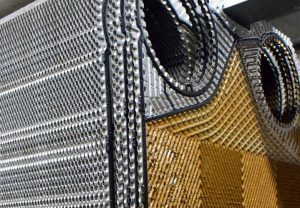 Before the advent and widespread adoption of modern heat exchangers, companies most often relied on older cooling solutions to meet their electrical thermal management needs. When it came to preventing electrical overheating within their various electrical enclosures, solutions like air conditioning and air compressing units were the most frequently implemented ones. Today, however, more companies across virtually industry are taking advantage of more advanced heat exchangers, which provide high-performance electrical cooling for most applications with significantly less energy and hassle.
Before the advent and widespread adoption of modern heat exchangers, companies most often relied on older cooling solutions to meet their electrical thermal management needs. When it came to preventing electrical overheating within their various electrical enclosures, solutions like air conditioning and air compressing units were the most frequently implemented ones. Today, however, more companies across virtually industry are taking advantage of more advanced heat exchangers, which provide high-performance electrical cooling for most applications with significantly less energy and hassle.
Their overall energy consumption is reduced
The energy requirements for older and more cumbersome cooling solutions was one of the greatest burdens that companies had to accommodate. Traditional processes that require the constant chilling and circulating of air rely on large amounts of energy to facilitate the process. With air conditioners and air compressors, the costs of effectively cooling electrical control panels and other enclosures can become exorbitant the more powerful the technology is. However, with modern heat exchangers, the process of managing electrical waste heat doesn’t require the same intensive process of creating chilled air. Instead, the cooling fluid inside of a heat exchanger rapidly absorbs the waste heat and is able to transfer it efficiently, and with minimal energy, to a heat sink where it can dissipate it.
They don’t require as much cooling maintenance
The reduced energy requirements of modern heat exchangers are an important factor in why increasingly more companies choose to implement them. This has grown increasingly more important in light of rising energy costs and a growing need for industries to implement more eco-friendly operations. However, the more streamlined methods of handling waste heat also provide several significant benefits to companies’ overall efficiency and productivity. Because they don’t rely on more complicated air conditioning or air compressing processes, modern heat exchangers consist of few or no external mechanical parts. This significantly reduces the risks of breakdowns or malfunctions and minimizes the need for routine maintenance on electrical cooling systems.
They can customize their cooling solutions effectively
When companies implement more advanced technologies to further enhance their operations, the significant advantages that heat exchangers provide become even more impactful. To optimize an application’s overall operations, companies can more easily customize modern heat exchangers to meet the application’s unique electrical cooling needs. The simplified methods heat exchangers use to transfer heat, including natural/forced convection, conduction, and phase-change cooling, can be customized to transfer heat within unique operating parameters. For more information about how companies upgrade their cooling with heat exchangers, call Noren Thermal Solutions in Taylor, TX, at 866-936-6736.







